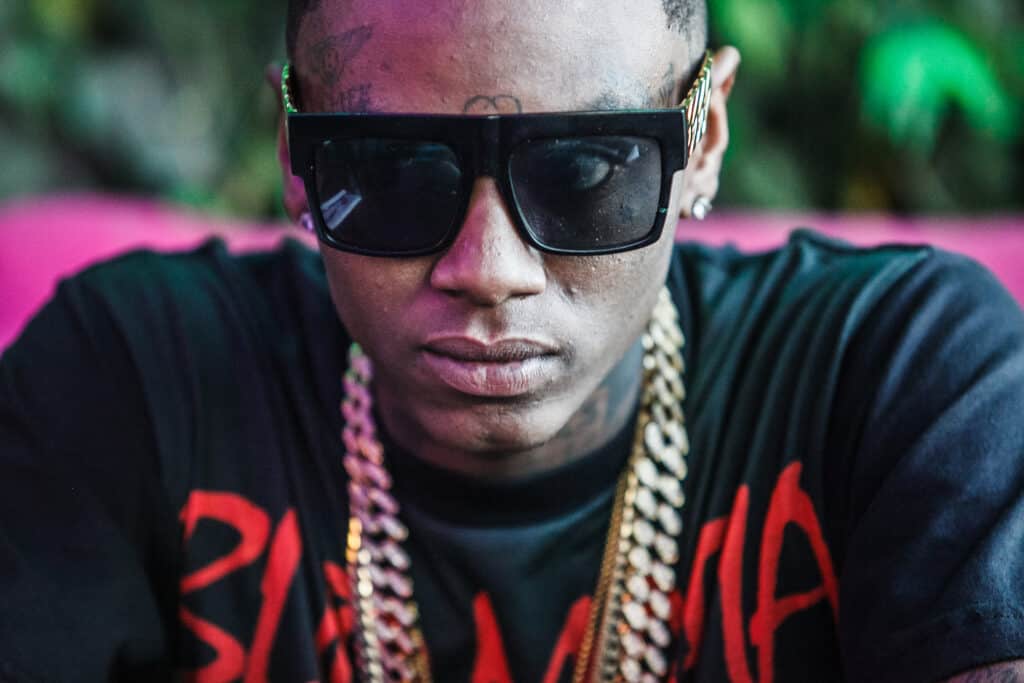In 2007, Soulja Boy became an overnight superstar when he topped the charts. What was his first song?
Soula Boy’s first single was 2007’s “Crank That (Soulja Boy)”, which reached number 1 on the Billboard Hot 100 singles chart. It was also the first song to sell 3 million digital downloads in the US.
For more on Soulja Boy, his rise to fame, and his first song, read on.
Soulja Boy
DeAndre Cortez Way was born in Chicago, Illinois on July 28, 1990. He relocated to Atlanta, Georgia when he was six years old and was introduced to rap music due to the city’s hot scene.
Eight years later, when Way was 14 years old, he and his father moved again to Batesville, Mississippi. By this time, the young Way had already decided that his goal was a career in music, and his father created a recording studio for his son to experiment with his music.
Using the name Soulja Boy, he began posting songs on SoundClick, a music-based social community. He received positive feedback and created accounts on both Myspace and YouTube, extending his reach.
With his online presence growing, Soulja Boy created his first mixtape, the lengthily titled “Unsigned & Still Major: Da Album Before da Album”. He released the mixtape online under his own SOD label.
Crank That
While working on the mixtape, Soulja Boy had also recorded the song that would become his debut single. He released “Crank That” online, accompanied by a video demonstrating how to dance along to the track.
After the song received local radio airplay, Soulja Boy was invited to meet with Michael Crooms, known professionally as Mr. Collipark. Crooms’ label, Collipark, was affiliated with Interscope Records and Soulja Boy signed a recording contract with the group.
“Crank That” officially released on May 2, 2007, and, three months later on August 12, the song was used on an episode of HBO’s “Entourage”. The song rapidly gained popularity, bolstered by its accompanying dance becoming an online craze.
On September 1, the song reached the top of the Billboard Hot 100 singles chart, becoming Soulja Boy’s first number 1 hit. The peak of the song’s popularity was well-timed, with his major-label debut album releasing a month later on October 2.
The album, “Souljaboytellem.com”, peaked in the number 4 spot on both the Billboard 200 albums chart and their Top R&B/Hip-Hop Albums chart. Soulja Boy has stated that he created the entire album using the demo version of FL Studio, likely making it one of the least expensive major-label albums of the 21st Century.
“Crank That” was nominated for Best Rap Song at the 50th Grammy Awards on February 10, 2008, but the award ultimately went to Kanye West and T-Pain for “Good Life”.
“Souljaboytellem.com” received mostly negative reviews from the entertainment press. Some felt that he signaled a shift in the hip-hip industry as one of the first rappers to use social media as a platform for greater success, a prediction that has since proven to be true with the rise of “SoundCloud rap” and others.
The song’s video has more than 450 million views on YouTube.

Continued Career
Despite the enormous success of “Crank That”, some critics predicted that Soulja Boy would be a one-hit-wonder. He released his second album, “iSouljaBoyTellem” a year later on December 16, 2008.
The album’s first single, “Bird Walk” peaked at number 40 on the Billboard Hot R&B/Hip-Hop Tracks chart.
Despite the worrying performance of “Bird Walk”, Soulja Boy’s next single, “Kiss Me Thru the Phone” was far more successful. It reached as high as number 3 on the Hot 100 and topped the Hot Rap Tracks chart.
Another single from the album, “Turn My Swag On”, reached number 19 on the Hot 100 and again topped the Rap Tracks Chart.
His third album, “The DeAndre Way”, was intended as Soulja Boy’s most personal album and he had hopes of working with some of the industry’s leading names such as Kanye West and Eminem.
The album failed to match his expectations and became his lowest-selling album, peaking at number 90 on the Billboard 200 albums chart.
“The DeAndre Way” marked the end of Soulja Boy’s major label work for the time being and the following years were dedicated to online releases and digital mixtapes. Even so, his use of the internet made him one of the most influential rappers of his generation.